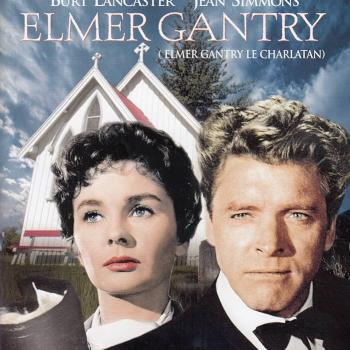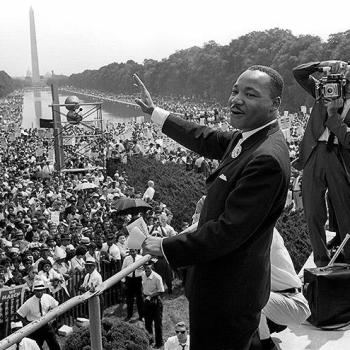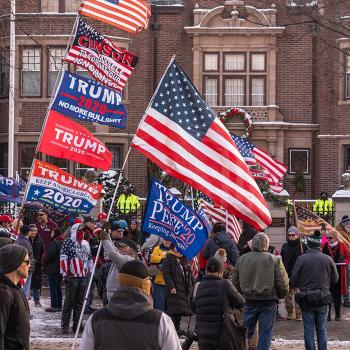I believe that people should weigh their political opinions in light of their faith commitments. For those who are Christians, I also think that those faith commitments ought to be decisive. But we craft those views in a pluralistic society in which many will be unsympathetic to what we believe and, where people are sympathetic, they will often agree for completely different reasons than the ones that motivate us. Rightly, our Constitution protects them and us, and I am grateful for that protection.
When I worked at Washington National Cathedral some years ago, I often met representatives from countries in the former Soviet Union and the Middle East who were studying church-state relations under the auspices of the United States Information Agency. Occasionally, Muslims (in particular) would suggest that as a "religious person," I should want a religious government, and—they argued—"What better religion to guarantee the freedom of everyone than Islam?" I believe that they were sincere and meant well. But their Syrian Christian colleagues vehemently disagreed and, over a decade later, that offer sounds even less attractive than it did in the fall of 2000.
There is something that is deeply unsettling, then, in the new Pew Foundation study that indicates a larger number of Americans than in the past want their clergy to be more explicit about their political views. Even if that is true, what does it mean in practical terms for clergy across the faith traditions?
Some could take the results of the survey as license to wade into the political affairs of the day, and those who already do will no doubt feel that their hand has been strengthened by the findings. But what if people really want help integrating their faith with their politics? And what if they are assuming that, on balance, their clergy will agree with their political views?
The former is a worthwhile goal, even if it is of little significance to their non-Christian neighbors. Christians can and should think deeply about the intersection between their faith and the political choices that they make. But the latter (i.e., the assumption that their pastor or priest will agree with them) is as unlikely as not. Given the general composition of the electorate, in fact, 45 percent to 55 percent of the average congregation is likely to disagree with their clergy. On that reading of things the opinionated priest and pastor is likely to disagree with roughly half of her or his congregation on a regular basis.
Disagreement is not a bad thing in and of itself. Debate can be clarifying and illuminating; and a carefully modulated conversation about the ways in which Christians might think about political issues can be helpful. But the pulpit is not a podium and when clergy begin to tell people specifically how they ought to vote on an issue they run the risk of confusing their pastoral authority with advocacy for partisan positions. Worse yet, they sabotage their relationship with the people they serve, sacrificing their primary vocation in the Body of Christ. I've known people of more than one political stripe who simply stopped attending church because their pastors took the position that their political views were the only tenable, Christian positions available.
So what are clergy to do?
One: Clergy should be sure that they've actually mastered the subject matter of their own vocation first. The first job of the clergy is to make Christ known and to care for souls. Everything else flows from that central commitment.
Two: They should study the issues of the day in a rigorous fashion and from every side of the issue. They should not simply parrot the position of their political party (which is what both most pastors and most voters do). If you can't claim a thorough command of the issues, you shouldn't be commenting to anyone but close friends and your family (if you dare).
Third: On most occasions, clergy should simply keep their opinions to themselves in spite of all that effort.
The sole exception to this rule is when moral imperatives are at issue and when the weak or the marginalized are at risk. Those issues are a fraction of the political issues that dominate our news. And, apart from those at the outer fringe of our national life, the vast majority of people are committed to protecting the weak and marginalized even though they differ on the means of meeting those needs. Those imperatives are a far better reason to be direct about your position on an issue, than is the desire to "play politics."
Even in those cases, the better course of action is to illuminate the problem, not take a position, and to teach people to think and vote for themselves in a sound and faithful fashion, rather than telling them how to vote on a single issue. After all, the politics of the day will change and what people need most are the tools to make faithful decisions, not a crib sheet for the voting booth.
Finally, we need to remember that while our vocation touches on the public, as well as the private, the vocation of priest, pastor, minister, or deacon is not one-and-the-same with political pundit and know-it-all. There are those who will disagree with you and they will disagree with you for good, sound, and faithful reasons. On that score, you are just one among millions with another opinion.
12/2/2022 9:10:36 PM





